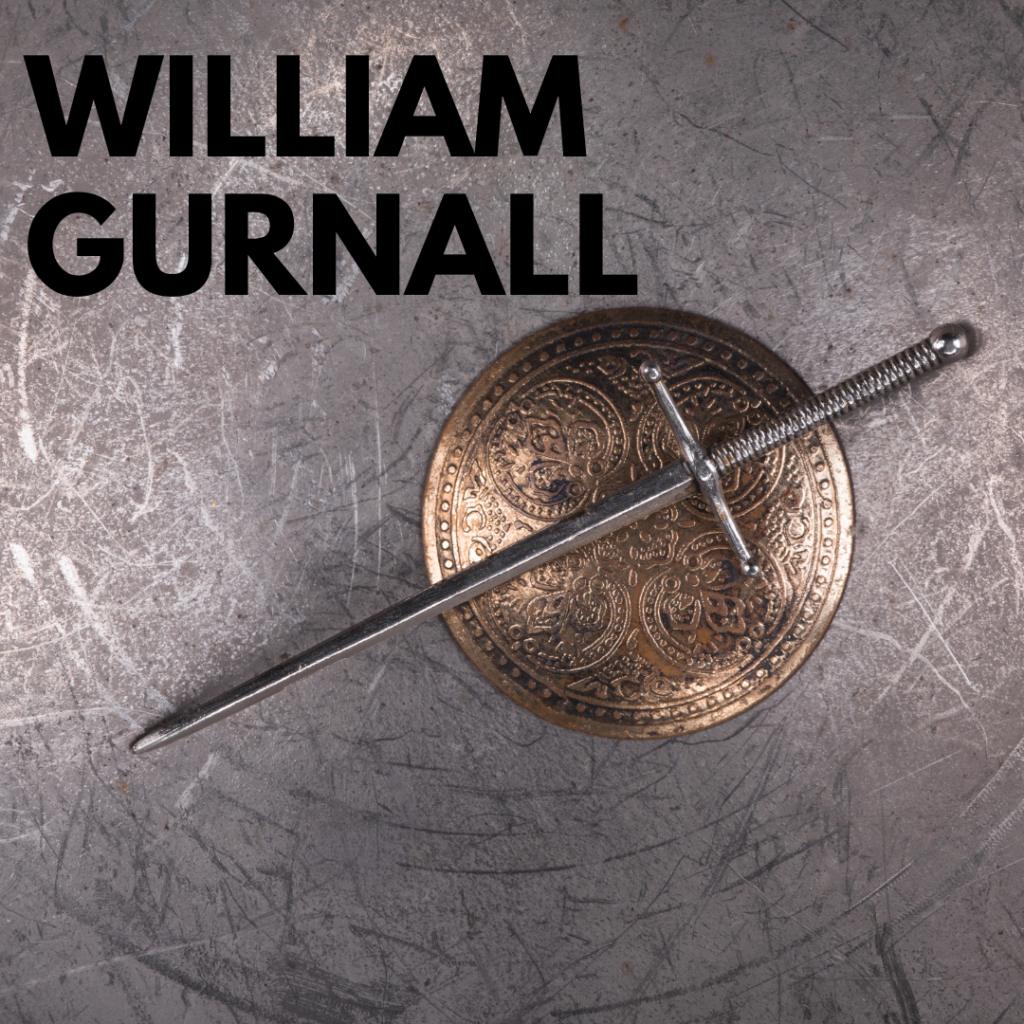William Gurnall (1617-1679), was born at King’s Lynn, Norfolk about 100 miles from London. As a conformist, Gurnall is a controversial figure in Puritan history, he is well-known to readers of Puritan theology, but his personal details and history are scarce. There are three key overarching themes about Gurnall’s life, he was a Puritan of the seventeenth century, he was an Anglican Minister of Lavenham, and he wrote a well-known book of practical divinity “The Christian in Complete Armour.”
Gurnall’s place of birth, the town of Lynn, had deep roots in the doctrines of the Reformation. He excelled in school as he was educated at the free grammar school of his native town which resulted in him gaining a scholarship to study at Emmanuel College, Cambridge, where he graduated BA in 1635 and MA in 1639. However, these were not easy times his father died, who was at one time the mayor of Lynn, when Gurnall was only fifteen, around the same time he pursued formal education in 1631. Not much is known of his mother other than she probably remarried and he had respect for her and his step-father.
At twenty-eight, Gurnall was appointed as curator and then rector of the Anglican Church at Lavenham, Suffolk, a town of about 1,800 inhabitants, and it was estimated that half of whom were his parishioners. At twenty-nine, he married a minister’s daughter, Sarah Mott, whom history says bore him at least fourteen children, eight survived him. Gurnall’s life was not easy as he spent it with poor health, political challenges, and the everyday challenges of being in the pastorate.
Gurnall lived through some unique times in England’s history: a civil war, the death of King Charles I, England under the rule of Oliver Cromwell, the death of Cromwell, and the restoration of the monarchy under King Charles II. One of the most controversial acts in Gurnall’s life was being in agreement with the Act of Uniformity and signing the declaration in 1662. When the likes of Baxter, Owen, Goodwin, Manton, Jenkins, and many other Puritans left the Church of England, Gurnall still stood his ground and was left behind creating a rift between the nonconformists and Gurnall. A book was even written against his decision to agree with the Act of Uniformity, published in 1665, entitled Covenant-Renouncers Desperate Apostates.
His decision still did not endear him to the Church of England as he was fully Puritan in his doctrine, preaching, and practice which was seen in The Christian in Complete Armour. Unfortunately, for Gurnall this meant neither side of the Act of Uniformity liked him. Demonstrating that a “neutral position” is not a wise decision in seasons of division and controversy. His reputation amongst the Puritans consequently suffered and is probably the reason so little has been written about William Gurnall in the annals of church history.
William Gurnall died on October 12, 1679, at the age of sixty-three. The Christian in Complete Armour, his most famous work, consists of sermons or lectures delivered in a consecutive course on Ephesians 6:10-20. The fact that a sixth edition was published in the year the author died highlights its merits were recognized early. It is described as a “magazine whence the Christian is furnished with spiritual arms for the battle, helped on with his armor, and taught the use of his weapon; together with the happy issue of the whole war. It is thus considered a classic on spiritual warfare.” Scholars have said, “the work is more practical than theological; and its quaint fancy, graphic and pointed style, and its fervent religious tone render it still popular with some readers.”
Despite Gurnall’s decision to conform, he should not be despised but learned from. In times of trial it is important to never be neutral, but through times of contemplation and prayer come to a decision and walk confidently in that choice, and if one was wrong seek repentance from the Lord and others. Gurnall’s work should also not be discredited as he received praise for The Christian in Complete Armour from the likes of Richard Baxter, John Flavel, John Newton, and C.H. Spurgeon. Newton said that if he was confined to one book besides the Bible, he said Gurnall’s Christian Armour would be his choice. Spurgeon commented that Gurnall’s work is “peerless and priceless; every line full of wisdom. The book has been preached over scores of times and is, in our judgment, the best thought-breeder in all our library.”
“A pilot without his chart, a scholar without his book, and a soldier without his sword, are alike ridiculous. But, above all these, it is absurd for one to think of being a Christian, without knowledge of the word of God and some skill to use this weapon.“ – William Gurnall, The Christian in Complete Armour

